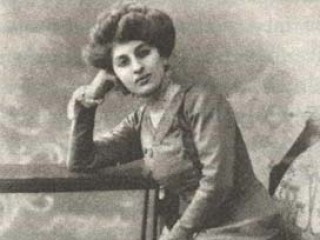
Halide Edip biography
Date of birth : -
Date of death : 1964-01-09
Birthplace : Istanbul, Turkey
Nationality : Turkish
Category : Famous Figures
Last modified : 2011-06-01
Credited as : Writer, The Clown and His Daughte,
Halide Edip Adivar was a Turkish writer, scholar, and public figure dedicated to the rights of women and their emancipation. She attempted to analyze the rapid transition of Turkish society and to depict the deep-seated conflict the society faced through the clash between Eastern and Western culture.
Halide Edip was born in 1884 in Istanbul as the daughter of Mehmet Edip bey, private treasurer of Sultan Abdulhamit II, later director of the Regie Francaise de Tabac at Yanina and Bursa. Although she did not attend primary school, she received private lessons from well known personalities in the field of social sciences, philosophy, and mathematics. After graduating in 1901 from the American Girls College in Istanbul, she married her former tutor, the mathematician Salih Riza bey; two boys—Ayetullah and Hikmetullah—were born to the couple. After 1907 her articles were published in the newspaper Tanin and other reviews under the name of Halide Salih.
When her husband decided to take a second wife, she asked for a divorce in 1910. From that year on she taught history and concentrated her attention on issues of education. During World War I she was formally invited to Syria, where she organized the public instruction system and served as inspector of the girls' secondary schools in Beirut and Damascus. In 1918 she married Adnan Adivar, a well-known professor of medicine who later became minister of health under Mustafa Kemal's leadership. In 1918 Halide Edip was appointed professor of Western literature at the University of Istanbul. Following the armistice Halide Edip enthusiastically adopted the peace proposals of President Woodrow Wilson and became an activist in favor of an American mandate. After realizing that none of the defeated nations adhered to Wilson's principles, she changed her mind and espoused the nationalistic cause proclaimed by Mustafa Kemal, later Ataturk.
Halide Edip was the first woman speaker at a mass meeting in Istanbul in 1919, protesting the occupation of Izmir by the Greek armed forces. After the occupation of Istanbul in March 1919 by the British, she fled with her husband, Adnan bey, to Anatolia to join Mustafa Kemal's forces. The sultan's government condemned to death in absentia Mustafa Kemal and five of his closest collaborators; one among the condemned was Halide Edip. After joining the nationalist forces in Anatolia, the young woman writer began to work at the general staff headquarters; later she was moved to the Western front. In recognition of her military services she was promoted to the rank of sergeant.
After the establishment of the Turkish Republic, Halide Edip, her husband, and like-minded friends founded the Progressive Republican Party as the major opposition party. Following a ban on this party in 1925, the Adivars went abroad and lived from 1926 to 1939 in Europe and the United States. Halide Edip was invited by Columbia University as guest professor in 1928-1929. She taught courses on the intellectual history of the Near East and on contemporary Turkish literature. In 1935 Mahatma Gandhi invited her to India, where she taught in New Delhi. The couple returned to their home country in 1939. From 1940 on Halide Edip headed the chair of English literature at Istanbul University. After the transition to a multiparty system, Halide Edip served one term in parliament as an independent member from Izmir (1950-1954). She died on January 9, 1964, in Istanbul and was buried in the cemetery of Merkezefendi.
The most important characteristic of Halide Edip's novels is the broad social framework she built around her stories. Without neglecting the psychological dimensions, her main emphasis was on providing the reader with an insight into the major social issues of the time. Among her heroes women play an important role. In her writings one comes across nationalistic women, modernized women, women with strong personalities, women rising up against oppression, and idealistic women striving to educate the masses. Her male heroes are much more statue-like; they lack energy and drive. Her language was full of feelings, vivid and warm. Instead of detailed descriptions she preferred an impressionistic style. Her best known novel, The Clown and His Daughter, was first written in English, later rewritten in Turkish; the novel was given a literary prize in 1942. The book won international fame and went through 25 editions.
The first phase of her novel-writing reflected excitement and observation (1908-1928); the second phase attempted to achieve a cultural synthesis (1928-1952). In her two volumes on the history of English literature emphasis was placed upon the climatic, historical, social, and political factors which influenced the literary products. Halide Edip also wrote a successful detective story—the Crime of Vol Palace—and a number of short stories and essays. Her memoirs reflect the atmosphere of her early childhood in a typical Eastern setting as well as the problems she had to face upon confronting Western civilization. However, her inconsistent ideological tendency, vacillating between pan-Turkism and pro-Americanism or Turkish nationalism and the ideal of Westernization, prevented her from basing her analyses and her proposed solutions on solid ground.
Halide Edip during her 80 years achieved great distinction as a novelist, social philosopher, and academician. She was the first public speaker to mobilize Turkish public opinion. Halide Edip served in the army. She was a rebel against traditions and threw herself into the struggle of her nation for life and liberty, but never ceased to be aware of the moral and cultural conflicts of her time.


















